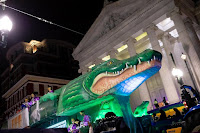I want to have some fun with this blog post. So it’s time for you to tell me some things. I hope you enjoy and will respond!
Recently, my book club selected the book, Eyes of a Monster, by Ron Peterson, Jr, for discussion at our monthly meeting and we had probably the biggest group we've had in years. It was standing room only until we brought in extra chairs. At the end, nobody wanted to leave. What sparked such enthusiasm? One of our members suggested a book, a murder mystery, that was actually set in our neighborhood. We chose it for our next meeting. And, oh yes, it was a true story. Only three names were changed and I think that was because the people referred to were minors at the time of the murder. It's exciting to see the names of people you actually know in a published book.
We're inching ever closer! Coastal Crimes, Volume II: Death Takes a Vacation is more than just a vision at this point. We've gathered submissions and are completing our internal review and making edits. Soon, we'll ship the manuscript off to Wildside Press, for another round of edits and formatting changes. This are exciting times as we approach the home stretch for our anticipated late winter/early spring 2024 release date.
True to our by-the-sea vibe, this next anthology features short stories by some of your favorite local authors, centered around a common theme: mysterious deaths involving a vacation destination in the Coastal Plain of Virginia or North Carolina east of Interstate-95.
More details to follow, including a cover reveal, when the time is right. Stay tuned!
Storytelling likely existed well before recorded history,
but the traditional mystery genre is actually quite new compared to some of the
earliest stories. Homer’s Illiad and the Odyssey, for
example, are generally dated in the late 8th to early 7th century
BC. Written in verse, these poems detailed the exploits of all the heroes and
heroines, kings and queens, gods and goddesses in the Trojan war, and later
King Odysseus’s travels home from the war.
Rarely were stories told
or written about the common or everyday folk. Chaucer’s Canterbury
Tales were one exception, but they were not written until the 14th century.
Even the few Shakespearean tales of the seemingly ordinary folk like Prospero
or Sly included kings, dukes or other noblemen and women. The infamous bards of
the Middle Ages dabbled in local lore and legends, but still told of
larger-than-life figures who were well known by their audiences. Robin Hood,
William Tell, and the Pied Piper came to mind. Those storytellers were also
well-versed in the local gossip and scandals of the Royal Court of the day, as
well as tales of the heroes in myths and legends such as Hercules or King Arthur. Interest in folklore, tales about the common people, didn’t begin until
the late 1700s in Europe, and then later bloomed when the Brothers Grimm
published their fairy tales in 1812.
 |
| Krewe of ALLA Parade 2023. |
.jpg) |
| Edgar Allan Poe |
Today I want to begin talking about a particular passion of mine—art for art’s sake. In this series, I’ll delve into two forms of creativity that I deeply love, which provide great joy, meaning, and value for their creators and audience (and in my own life): poetry and fanworks. Though some creatives involved in these art forms may well be professional writers, I’m classifying these particular types of creations as art for art’s sake because they are typically not associated with providing a living wage by themselves. They can indeed lead to other opportunities, help the writer develop necessary skills or experience the pleasure of interacting with an audience, or help to spark creativity in other areas that do lead to income. But fanworks are not compensated monetarily, by their very nature; and poetry most frequently pays relatively small amounts or in copies. Thus, those who invest their time and talents in creating poetry and fanworks—while these can sometimes be part of the career of a professional writer, artist, or teacher—are generally making these works for the love of them. The pleasure of creating these works and sharing them with the audience is in fact the primary reward.
In the early days of my relationship with AJ—who would later become my husband—he made an annual trek to Valentines, Virginia to mail a Vale...
